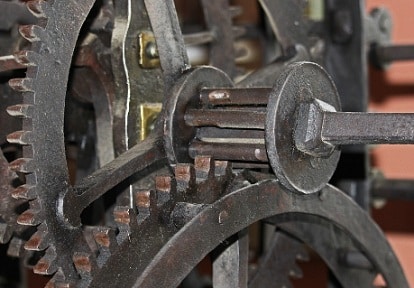 The predominant use of machines in industrial activity is known as machinism , a characteristic of the modern era. The term is usually used to refer to the incorporation of machinery and systematized processes that took place at the end of the First Industrial Revolution .
The predominant use of machines in industrial activity is known as machinism , a characteristic of the modern era. The term is usually used to refer to the incorporation of machinery and systematized processes that took place at the end of the First Industrial Revolution .
Thanks to machinery, production costs were reduced and the manufacturing of all types of goods was simplified. The phenomenon, in turn, led to the elimination and replacement of jobs, one of its negative aspects.
Machinery developed especially in the United Kingdom in the last part of the 17th century . The invention of the combustion engine and the electric motor; the creation of new means of transportation and communication ; and the development of artifacts to be used at the domestic level were key.
With machinery not only the economy changed: general changes were also carried out at a social level. While entrepreneurs managed to start producing more with less expenses and in less time, workers organized to face the massive incorporation of machines and thus protect artisanal work.
According to some specialists, machinery also appears in the innovations that took place in the most recent decades. At an increasing rate, robots and computers (computers) are replacing human beings in different spheres of the world of work. Machines are no longer only called upon to perform physical actions, but cybernetic devices are even responsible for solving intellectual issues through programming.
Therefore, the fight between those who defend artisanal work and those who promote the use of machines to replace it is not over yet. Both parties have reasons to defend their positions , which is why it is difficult to completely agree with one of them to the detriment of the other. Let's look at some of the advantages of machines over human labor:
 * greater efficiency : robots and computers can process data at a speed much faster than our species. Although they still do not have comparable intelligence to this day, capable of understanding the world as we do, for repetitive work they perform much better;
* greater efficiency : robots and computers can process data at a speed much faster than our species. Although they still do not have comparable intelligence to this day, capable of understanding the world as we do, for repetitive work they perform much better;
* they do not get tired : although machines require periodic maintenance, they can carry out tasks that would be exhausting for humans for much longer, since they never lose energy to keep going;
* negligible margin of error : no matter how much experience a person has in their profession, their tendency to make mistakes is much greater than that of a machine. Let us not forget that in us technique is combined with mood, fatigue, personal problems, state of health, the influence of the weather, etc., all aspects that do not affect a robot.
These and other advantages can serve to support the defenders of machinery, but it is also possible to point out those aspects that for the moment are exclusive to human workers . Firstly, the fact that they are of the same species as those who employ them and the recipients of their products; This allows them to comment on decisions with a compatible point of view, instead of simply completing tasks.
Sensitivity is one of our greatest treasures, and one of the few that at the moment saves us from being completely replaced by machines. We do not need to be told "do not harm other workers" or told that "tables must have legs", because we know these and many other things due to cultural reasons.
